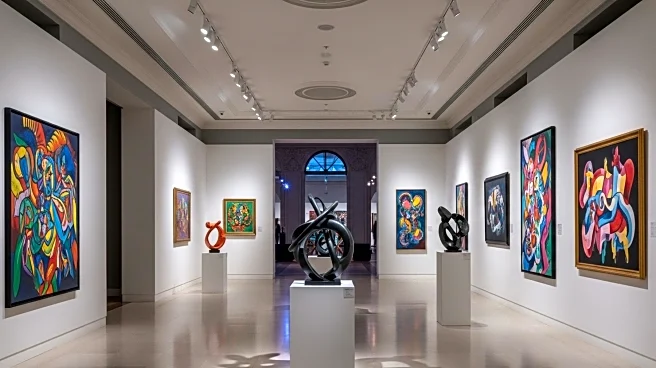What's Happening?
Detroit is set to introduce a new contemporary art platform, Detroit Salon, which aims to connect local artists with global audiences. The initiative, backed by the State of Michigan and other partners, will debut internationally in Paris in fall 2025, followed by a community-driven artist call in January 2026, and culminate in a citywide edition in Detroit in 2028. The Detroit Salon Art House in Paradise Valley will serve as the headquarters, hosting year-round exhibitions and artist development programs. The platform seeks to elevate Detroit's visual arts scene, which has a rich history, and connect it with international art fairs such as Art Basel and 1-54 Contemporary African Art Fair.
Why It's Important?
The launch of Detroit Salon is significant as it positions Detroit as a major player in the global art scene, potentially boosting cultural tourism and economic activity in the region. By connecting Detroit artists with international audiences, the initiative aims to enhance their career opportunities and business capacities. The platform also seeks to preserve Detroit's unique cultural voice while engaging with global networks, which could lead to increased visibility and investment in the city's art scene. This effort aligns with Detroit's historical role as a hub for industrial, social, and artistic movements, further solidifying its status as a cultural capital.
What's Next?
The first international exhibition will take place in Paris in fall 2025, followed by an open call for artists in January 2026. The inaugural citywide edition in Detroit is scheduled for fall 2028, with plans for the fair to recur every two years thereafter. Organizers aim to measure success through artist opportunities, institutional traffic, and cultural tourism. The initiative will continue to build relationships with global partners and expand its advisory group to ensure diverse representation and engagement with Detroit's artistic community.
Beyond the Headlines
Detroit Salon's establishment in Paradise Valley, a historically significant neighborhood, ties the project to Detroit's legacy of Black entrepreneurship and creative self-determination. This move underscores the importance of cultural heritage and community empowerment in the city's artistic narrative. The initiative also highlights the potential for art to drive social change and economic development, fostering a vibrant ecosystem that supports artists across disciplines and generations.









